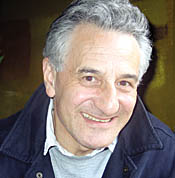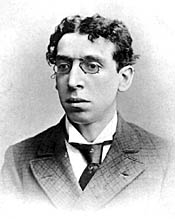|
|
 |
| |

Israel Zangwill

Henry Goodman
|
Actor Henry's love for 'the Jewish Dickens'
Henry Goodman brings the words
of Victorian novelist Israel Zangwill to life, writes Jane Wright
ISRAEL Zangwill’s novel Children of the Ghetto was written
in 1892, is long out of print and, according to award-winning
actor Henry Goodman, “hardly known outside arcane academic
circles”.
And yet, the star of Chicago Richard the Third, Hampstead Theatre’s
2001 anti-New Labour satire Feelgood and winner of two Olivier
Best Actor awards, confesses: “I’ve been working on
a dramatised reading of it for weeks for peanuts.”
The result will be an hour-long performance, alongside EastEnders’
Chrissie Watts, actress Tracy-Ann Oberman, at annual literary
festival Jewish Book Week in Bloomsbury on Sunday.
So what’s the attraction?
Over coffee on his way to teach a masterclass at Cecil Sharpe
House, Primrose Hill, for the British-American Drama Academy,
Goodman explains: “The book was a real discovery for me
when I came to open an exhibition about Israel Zangwill at the
Jewish Museum in Albert Street, Camden Town, a year or two ago.
I felt I had been dabbling my feet in the river for many years
and suddenly looked down and saw gold. In its time, Children
of the Ghetto was the greatest novel of Anglo-Jewish literature
ever published. And I think it’s not cheap to say it’s
amazingly topical now.”
Zangwill has been dubbed the Jewish Dickens and Goodman says:
“He has the knack of making you care about his characters,
as Dickens does with Miss Haversham or David Copperfield.”
Children of the Ghetto deals with the lives of the Jewish immigrant
community in the writer’s native Whitechapel in east London
more than 100 years ago. The admiring actor continues: “He’s
got the gift of capturing it, the sights and sounds and smells.”
And Goodman should know.
He also was born in Whitechapel, 55 years ago. Like Zangwill’s
parents, his grandparents were Ashkenazy Jews from Eastern Europe
and he recalls: “My mother used to sit up and sew coats
through the night to support her kids, exactly the same as in
the book.” He adds that, like Zangwill’s characters
who benefitted from charity: “I got shoes and a duffel
coat to go to school from the Jewish Board of Guardians.”
Clearly for Goodman, the topicality of Children of the Ghetto
is no longer tied to Petticoat Lane.
He reflects: “The Jewish diaspora of the East End has gone
to Finchley and Stamford Hill.” Or in his case, leafy south-west
London. “But,” he says, “although we can surround
ourselves with social artefacts which we think make us immune
from the tensions of the past, issues such as marrying in or
out of the Jewish community will never go away.”
Indeed, he contends, the human tensions Zangwill depicts between
Sephardic Jews from the Caribbean, who felt themselves superior
to the later Ashkenazy incomers from some tiny Russian ‘stetl’
exist to this day. Then there’s the tension between traditional
values and a modern society. And it’s all an absolute mirror
of what’s going on now in the Muslim community. Zangwill’s
aspiration as a writer was to create a morality that was bigger
than Judaism or Christianity or Islam.
Passion has always been part of Goodman’s character, too.
In earlier days it was manifest in Kentish Town. After graduating
from Bloomsbury’s Royal Academy of Dramatic Art, when he
lived in Belsize Park and “my life was the 24 bus route”
and where his son Ilun is now also a student, he stayed in the
area.
Inhabiting a commune in a squat in Malden Road, he appeared
in experimental shows at the Roundhouse and “used street
theatre as a tool to help the community. We would get kids off
the street in Kentish Town to make plays to show to Camden Council
to get the rats out of their flats,” he adds. In those
days, he continues: “I wanted nothing to do with the acting
mainstream I’m now part of.” But the driving ambition
instilled in him from his boyhood in Whitechapel would eventually
come out.
Goodman recalls: “As a boy, I was taken to see paintings
by Holbein and El Greco at the National Gallery and told, just
because you’re from the wrong side of the tracks, don’t
lower your sights.
“And everyone had a hunger for pursuits. People who sold
schmutters all day in Petticoat Lane would then come to our
community centre – it’s now swanky flats – to
teach us kids athletics and dancing.” As a result, he maintains:
“I’m not a vanishing flower, I’m really hungry
too.”
That hunger still drives him to take risks, as he did starring
in sell-out success Feelgood at Hampstead Theatre in 2001. But,
Goodman says, the ruthless satire on New Labour spin “only
became a hit because doing it was very frightening”.
“Then it became the first biting political satire for many
years in the West End,” he explains.
By the same token, being very publicly fired from The Producers
on Broadway just a month into a nine-month starring contract
in 2002 was “very painful”.
“But if you have ambition, as I do, and a lot of ability,
you have to pay the price for your appetites,” he continues.
“However, the English shouldn’t be scared of ambition.”
Right now his ambition is focussed on Israel Zangwill’s
Children of the Ghetto, and it’s undimmed. He says: “I
want people to go away from Jewish Book Week thinking ‘I
simply must get hold of this book’.”
|
|
 |
|


